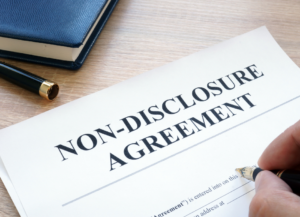For many years, NDAs have been utilized by individuals and businesses as a way to protect confidential information and prevent unauthorized disclosure. However, the misuse of NDAs, particularly in cases of workplace harassment and discrimination, has prompted lawmakers to take action.
New York Governor Kathy Hochul enacted Senate Bill S4516 to strengthen worker protections. This law modifies Section 5-336 of the state’s General Obligations Law (GOL). This amendment tightened restrictions on how non-disclosure agreements (NDAs) can be used in specific workplace settlements.
These changes went into effect on November 17, 2023, and apply to any agreements signed after that date.

Evolution of GOL 5-336
GOL 5-336, a pioneering law in the #metoo movement, was created to address the issue of workplace sexual harassment and the use of confidentiality clauses in settlement agreements. Initially, the law prohibited employers from requiring confidentiality in these agreements unless the employee had expressed a desire for confidentiality after 21 days for consideration. The latest amendments to the law include five significant changes in the following areas.
- Expanded Restrictions on Use of NDAs
- Prohibited Provisions in Settlement Agreements
- Settlement agreements cannot require complainants to make any statements or assertions that they were not subject to unlawful discrimination.
- The amendments also prohibit including provisions requiring complainants to pay liquidated damages if they violate the terms of a non-disclosure or nondisparagement clause.
- Lastly, the amendments also prohibit settlement agreements from including provisions that allow for the forfeiture of all or part of the consideration for the agreement if the complainant violates the terms of a non-disclosure or nondisparagement clause.
- New Provisions for Pre-Litigation Settlement Agreements
- Expanding the Scope of Applicability
- Notice to Complainants
Previously, the restrictions on using NDAs only applied to claims of unlawful discrimination. However, the recent amendments have broadened these limitations to include settlements, agreements, and other resolutions involving allegations of harassment or retaliation violating laws prohibiting discrimination. This means that NDAs cannot conceal workplace misconduct or violate anti-discrimination laws.
In addition to expanding the scope of restrictions, the amendments also prohibit certain specific provisions in settlement agreements related to harassment or discrimination claims. These include:
Previously, pre-litigation settlement agreements in New York required complainants to have 21 days to consider including a confidentiality provision. However, this consideration period is now waivable, meaning the complainant can agree to a shorter period.
While this amendment affects most claims, discrimination claims filed in court are still subject to the full 21-day waiting period under Section 5003-B of the New York Civil Practice Law & Rules.
Under the amended GOL 5-336, the restrictions on using NDAs now extend to employees and independent contractors. This change further expands the protection for individuals who may have faced discrimination, harassment, or other workplace misconduct.
One of the most significant changes to New York’s NDA law is requiring the settling complainant to be notified that they are not prohibited from speaking to the New York Attorney General.
Are you frustrated navigating the #MeToo settlements with outdated NDAs in New York? You can now speak up by downloading your FREE, attorney-reviewed, AND up-to-date NDA templates at forms.legal to navigate settlements confidently.